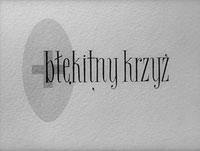 Błękitny krzyż
Błękitny krzyż
Poland, 1955, black and white, 56 mins
Even more than The Stars Must Burn (Gwiazdy muszą płonąć, 1954), The Men of the Blue Cross blurs the distinction between fact and fiction. So much so, in fact, that at 56 minutes this is effectively Andrzej Munk’s first solo feature, essentially an adventure story about a real-life rescue mission carried out by the Voluntary Tatra Mountain Rescue Service towards the end of World War II. Although Munk’s treatment was adapted from Adam Liberak’s short story, this in turn was sourced from one of the Rescue Service’s official diaries, and additional verisimilitude was added by tracking down many of the real-life participants and persuading them to relive their experience on film. If it’s not quite a Polish Touching the Void (2003) – its narrative is far more straightforward, with nothing approaching that film’s appalling central dilemma – it’s nonetheless squarely in the same genre, as emphasised by the opening scene of a man staggering across snowy wastes before tumbling down an icy slope.

It’s set in early 1945, when the outcome of the war was no longer in doubt but sporadic fighting was still going on. Three wounded men are trapped in a ‘field hospital’ (actually a rickety shack halfway up a mountain) in German-controlled territory, dangerously near a newly-constructed outpost. Repiszczak was shot in the leg, which he now cannot bend, while Russian paratrooper Maxim Oleynikov has severe frostbite in both legs (in one painful scene, he has to have his toes amputated without anaesthetic to avoid gangrene). Partisan fighter Sedyakov (aka Tikhon) is more mobile, but being shot in the lung has affected his stamina. The hospital’s entire staff consists of Slovak-born Dr Juraj and his foster-daughter Bożenka, and they have to get their patients out to nearby Zakopane if they’re to have a chance of recovery.
So Juraj rounds up a six-strong team of experienced mountaineers, led by Stanisław Byrcyn, who has worn the Rescue Service’s distinctive blue cross armband for half a century. Less helpfully, there’s Byrcyn’s dog Bass, which tags along with them and repeatedly threatens to betray their position to the Germans. The bulk of the film consists of the rescue mission, and aside from the reliance on Gustaw Holoubek’s voice-over narration (there’s very little synchronised sound), it could easily have been shot for a dramatic feature, consisting as it does of a series of action sequences including a close encounter with an avalanche, some high-speed skiing, and a shootout with a passing German patrol. It would take a filmmaker of rare incompetence to fail to do something with the spectacular Tatra scenery, and cinematographer Sergiusz Sprudin rises to the challenge with a series of increasingly vertiginous camera positions that suggest that Munk and his crew took just as many physical risks as the people they were filming.

One immediate difference between this film and its predecessors is that the narration no longer takes a God’s (or state’s)-eye view of the proceedings. By quoting directly from the rescuers’ official diaries, Holoubek effectively becomes a member of the team, drawing the viewer into the operation. The dearth of synchronised sound precludes much identification with individuals (there’s clearly something going on between Maxim and Bożenka, but it’s restricted to sidelong glances), but that’s in line with what was still the dominant Socialist Realist mode of stressing the co-operative element – in this case an international one, as the Soviets, Slovaks and Poles are effectively as one. But this time round, Munk almost entirely rejects the ideological lecture: the narration is as likely to single out achievements of individuals like Byrcyn as it is to champion the work of the Rescue Service as a whole.
- Director: Andrzej Munk
- Script: Andrzej Munk, based on the story by Adam Liberak
- Camera: Sergiusz Sprudin
- Editing: Jadwiga Zajiček
- Narration: Karol Małcużyński
- Voice-Over: Gustaw Holoubek
- Sound: Zbigniew Wolski
- Music: Jan Krenz
- Production Manager: Wilhelm Hollender
- Production Company: Wytwórnia Filmów Dokumentalnych (Documentary Film Studio)
- With the participation of: Stanisław Byrcyn-Gąsienica, Stanisław Wawrytko, Stanisław z Lasa Gąsienica, Ludwik Ziemblic, Józek Krzeptowski, Józef Wawrytko, Elżbieta Polkowska, Wojciech Siemion
The film is included on PWA’s Polish School of the Documentary: Andrzej Munk double-DVD set (Region 0 PAL). For the most part, the source print is in superb condition: there’s some very minor print damage at times, but for the most part the image is virtually pristine. The contrast range is sufficiently wide to bring out the black and white cinematography to its best advantage, but without ever losing detail in the highlights and shadows. The soundtrack is typical 1950s mono, with a certain amount of hiss and crackle but no seriously distracting problems. The subtitles are comprehensive and generally excellent, with only a couple of minor typos and an inconsistent approach to spelling the name ‘Juraj’. Online commentary is provided by this Culture.pl overview of Munk’s career, which briefly mentions The Men of the Blue Cross.